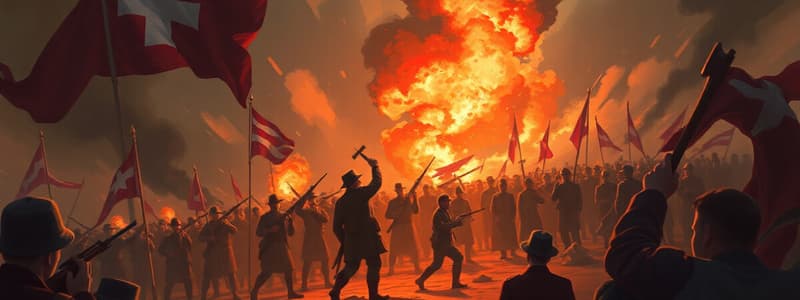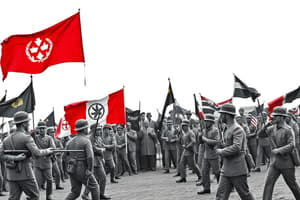Podcast
Questions and Answers
Which ruling dynasty was not mentioned as being destroyed during the War?
Which ruling dynasty was not mentioned as being destroyed during the War?
- Hohenzollern in Germany
- Habsburg in Austria-Hungary
- Bourbon in France (correct)
- Romanov in Russia
What was one of the main aims of the League of Nations?
What was one of the main aims of the League of Nations?
- To prevent future wars through international cooperation (correct)
- To allow States to maintain large standing armies
- To encourage secret treaties and alliances
- To promote economic competition among States
Which of the following was a requirement imposed on member States by the League of Nations?
Which of the following was a requirement imposed on member States by the League of Nations?
- Member States were to respect each other's sovereignty (correct)
- Member States were to engage in military alliances
- Member States were to build larger military forces
- Member States were to ignore disputes between them
What significant political change occurred in Europe as a result of the War?
What significant political change occurred in Europe as a result of the War?
Which of the following regions became independent states after the War?
Which of the following regions became independent states after the War?
What was a significant reason for the spread of nationalism in the context of the First World War?
What was a significant reason for the spread of nationalism in the context of the First World War?
Which major powers were part of the Triple Entente formed to counter the Triple Alliance?
Which major powers were part of the Triple Entente formed to counter the Triple Alliance?
What was the immediate cause of the outbreak of the First World War?
What was the immediate cause of the outbreak of the First World War?
What role did the race for armaments play in the lead-up to the First World War?
What role did the race for armaments play in the lead-up to the First World War?
What was the contributing factor of imperialism to the outbreak of the First World War?
What was the contributing factor of imperialism to the outbreak of the First World War?
Which country was allied with the Triple Alliance during the First World War?
Which country was allied with the Triple Alliance during the First World War?
What was the ideology behind aggressive nationalism during the lead-up to the First World War?
What was the ideology behind aggressive nationalism during the lead-up to the First World War?
What was a key reason for Germany's militarization in the early 20th century?
What was a key reason for Germany's militarization in the early 20th century?
What was one of the main purposes of the Treaty of Versailles?
What was one of the main purposes of the Treaty of Versailles?
Which countries were part of the Central Powers during World War I?
Which countries were part of the Central Powers during World War I?
Who played a significant role in determining the terms of the Treaty of Versailles?
Who played a significant role in determining the terms of the Treaty of Versailles?
What was a major consequence for Germany as stated in the Treaty of Versailles?
What was a major consequence for Germany as stated in the Treaty of Versailles?
How many soldiers was the German Army restricted to after the Treaty of Versailles?
How many soldiers was the German Army restricted to after the Treaty of Versailles?
What area was given to France for control as part of the Treaty of Versailles?
What area was given to France for control as part of the Treaty of Versailles?
Which of the following was a result of the territorial rearrangements following World War I?
Which of the following was a result of the territorial rearrangements following World War I?
What did the Treaty of Versailles declare regarding Germany's military equipment?
What did the Treaty of Versailles declare regarding Germany's military equipment?
Flashcards
World War I
World War I
A major war fought on a global scale, affecting almost all countries of the world, from 1914-1918.
Nationalism
Nationalism
Strong sense of unity and pride in one's country, often leading to aggressive behavior toward other nations.
Imperialism
Imperialism
A powerful nation dominating another, often by territorial acquisition or political/economic control.
Race for Armaments
Race for Armaments
Signup and view all the flashcards
Triple Alliance
Triple Alliance
Signup and view all the flashcards
Triple Entente
Triple Entente
Signup and view all the flashcards
Sarajevo Crisis
Sarajevo Crisis
Signup and view all the flashcards
Dynasties overthrown by WWI
Dynasties overthrown by WWI
Signup and view all the flashcards
Colony
Colony
Signup and view all the flashcards
Ottoman Empire's fate after WWI
Ottoman Empire's fate after WWI
Signup and view all the flashcards
Formation of new nations after WWI
Formation of new nations after WWI
Signup and view all the flashcards
Impact of WWI on monarchy
Impact of WWI on monarchy
Signup and view all the flashcards
League of Nations goal
League of Nations goal
Signup and view all the flashcards
Austria's Ultimatum
Austria's Ultimatum
Signup and view all the flashcards
Treaty of Versailles
Treaty of Versailles
Signup and view all the flashcards
German Aggression
German Aggression
Signup and view all the flashcards
Demilitarization
Demilitarization
Signup and view all the flashcards
Territorial Losses
Territorial Losses
Signup and view all the flashcards
Reparations
Reparations
Signup and view all the flashcards
Allied Powers
Allied Powers
Signup and view all the flashcards
Central Powers
Central Powers
Signup and view all the flashcards
Study Notes
World War I
- Fought on a worldwide scale, affecting almost all countries
- Unprecedented extent of spread, impact, and damage
- Also known as the First World War
Causes of World War I
-
Nationalism and Imperialism:
- Nationalism: Sense of unity based on shared history, language, and culture, leading to aggressive patriotism and hatred of other countries.
- Imperialism: Policy of extending a country's power and influence through acquiring colonies for resources, labor, and markets.
- Countries like England and France had large empires in Asia and Africa; Germany, Italy, Russia, and Japan wanted to expand their empires as well.
-
Arms Race:
- Major powers stockpiled weapons for self-defense, but this led to a cycle of increasing armaments, fear, and mutual hatred.
- Germany's growing military strength concerned Britain and France, intensifying the competition.
-
Division of Europe into Hostile Groups:
- Triple Alliance (Germany, Austria-Hungary, Italy) and Triple Entente (England, France, Russia) formed opposing camps.
- Japan joined the Triple Entente later.
Sarajevo Crisis (Immediate Cause)
- Archduke Franz Ferdinand, heir to the throne of Austria-Hungary, assassinated in Sarajevo (Bosnia) on June 28, 1914.
- Assassination organized by a Serbian nationalist group.
- Austria issued an ultimatum to Serbia, leading to a declaration of war on July 28, 1914.
- Russia supported Serbia; Germany declared war on Russia and France; Britain declared war on Germany.
Sides of the War
- Allied Powers: Britain, France, Russia, and their allies.
- Central Powers: Germany, Austria-Hungary, and their allies.
Results of the War
-
Treaty of Versailles (June 28, 1919):
- Signed by the Allied powers, led by the US, Britain, and France.
- Germany held responsible for the war and required to pay reparations (33 billion dollars).
- Germany lost territory, its military weakened, and its colonies taken over.
- Alsace-Lorraine returned to France, along with other territories.
-
Territorial Rearrangements:
- European powers' dominance diminished.
- Major empires (like Romanov in Russia, Hohenzollern in Germany, Hapsburgs in Austria-Hungary) were destroyed.
- The Ottoman Empire collapsed.
- New independent states arose (Czechoslovakia, Yugoslavia).
- United States emerged as a dominant world power.
-
League of Nations:
- Created to prevent future wars and promote international cooperation.
- Member states were expected to refrain from secret treaties and maintain limited armies.
- Disputes should be settled peacefully.
- All member states had to respect each other's independence.
Studying That Suits You
Use AI to generate personalized quizzes and flashcards to suit your learning preferences.




